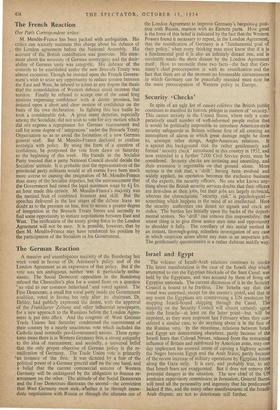The French Reaction
Our Paris Correspondent writes:
M. Mendes-France has been packed with ambiguities. His critics can scarcely maintain this charge about his defence of the London agreement before the National Assembly. His account of the British contribution was generous. His state- ment about the necessity of German sovereignty and the desir- ability of German unity was categoric. His defence of the controls to be established under the new BrusEels Treaty was almost excessive. Though he insisted upon the French Govern- ment's wish to seize any opportunity to reduce tension between the East and West, he refused to admit in any degree the thesis that the consolidation of Western defence could increase that tension. Finally he refused to accept one of the usual long motions expressing confidence with a dozen provisos, but insisted upon a short and clear motion of confidence on the basis of his own declaration. In fighting this last battle he took a considerable risk. A great many deputies, especially among the Socialists, did not wish to vote for any motion which did not express a repugnance for German rearmament and call for some degree of integration' under the Brussels Treaty Organisation so as to avoid the formation of a new German general staff. But M. Mendes-France declined to confuse nostalgia with policy. By using the form of a question of confidence, he postponed the vote from dawn on Saturday to the beginning of this week. His friends in the Socialist Party insisted that a party National Council should decide the Socialists' attitude. It is probable that the representatives of the provincial party militants would at all events have been much more averse to causing the resignation of M. Mendes-France than many of the Socialist deputies, but the announcement that the Government had raised the legal minimum wage by 61 frs. an hour made this certain. M. Mendes-France's majority was the merited fruit of combined firmness and skill. But the speeches delivered in the last stages of the debate leave no doubt as to the pressure on him, first to secure a greater degree of integration in the Brussels Treaty forces and secondly to find some opportunity to initiate negotiations between East and West. The ratification of the treaty giving force to the London Agreement will not be easy. It is possible, however, that by then M. Mendes-France may have reinforced his position by the participation of the Socialists in his Government.


































 Previous page
Previous page